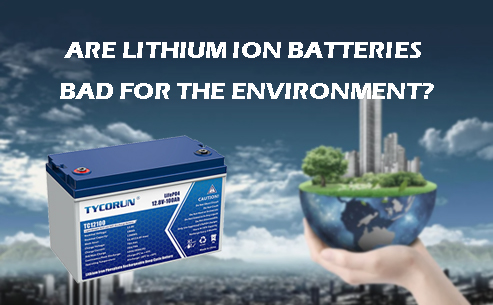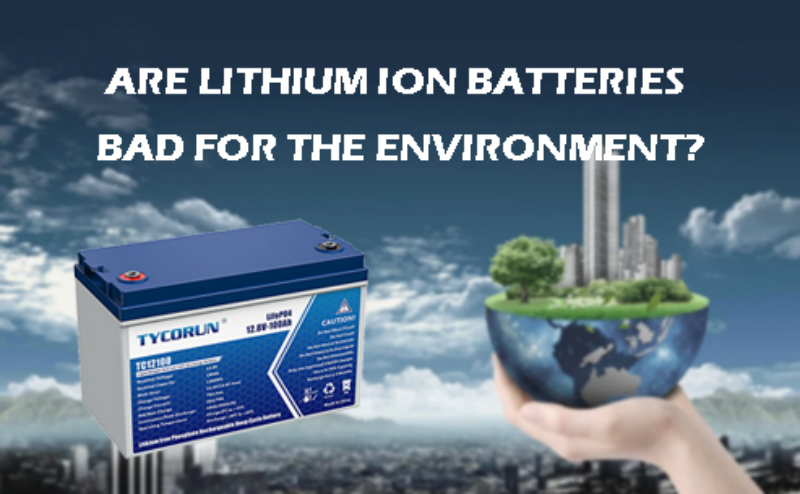
Main content:
- Which batteries are harmful for the environment? Are lithium ion batteries bad for the environment?
- Are lithium batteries clean energy? Do lithium-ion batteries use fossil fuels?
- Do lithium ion batteries have a carbon footprint?
- Why are lithium-ion batteries so popular? What are the advantages of lithium-ion batteries in terms of environmental protection?
- How bad are Tesla batteries for the environment?
- Do lithium batteries need to be recycled? Can lithium batteries be 100% recycled?
- What are the benefits of recycling lithium ion batteries? What are recycled lithium batteries used for?
- Which is better for the environment lithium or alkaline batteries?
- In-detail comparison of the environmental protection degree of different battery
In the current era of technological, almost all equipment relies on lithium ion rechargeable batteries to power it. They can be used as the best kayak battery, can run as many hearing aids and drones and, to a significant extent, can run boat, solar energy system, computer data centers, and other emergency power-using equipment like UPS. With the development of science and technology economy, energy and environmental problems have become increasingly prominent, low-carbon development is gradually becoming a global trend, and high-performance environmentally friendly and pollution-free batteries have also attracted much attention. Are widely used lithium-ion batteries polluting the environment? The main issue discussed in the article is are lithium ion batteries bad for environment?This article will give a detailed answer to the question of are lithium ion batteries bad for environment?
1.Which batteries are harmful for the environment? Are lithium ion batteries bad for the environment?
Are lithium ion batteries bad for the environment, the answer to this is no, as compared to lead acid batteries. Lead acid batteries are harmful as they emit some harmful gases during the discharge cycle. The hydrogen sulfide is emitted from the lead storage battery and it is colorless and poisonous gas. Sometimes they are not good and potentially cause problem for the health of animals and humans if it is not disposed properly. This battery is hazardous since it contains acid, which can burn the skin upon touch and is poisonous. Therefore, when changing it, particular care must be taken, and if you are not an expert, you must first take safety precautions.
Are lithium ion batteries bad for the environment, the question is of great concern in this age of development. Compared to lead-acid batteries, lithium-ion batteries are more atmospheres friendly. This is because lithium-ion batteries are completely sealed and will not emit harmful gases in the process of use, and lithium-ion batteries do not use heavy metals like mercury, lead, cadmium, nickel, and lead-acid batteries. However, the question, are lithium ion batteries bad for the environment, and research indicate that lithium-ion batteries also have a little negative influence on the environment. Electrodes are made from metals like nickel and cobalt, which have a negative effect on the environment of ternary lithium ion battery. But this harm is relatively small, and will only appear in the production process.
2.Are lithium batteries clean energy? Do lithium-ion batteries use fossil fuels?
Are the lithium ion is clean source of energy and are lithium ion batteries bad for environment are the questions of great concern in this article. Electrical power is clean with no exhaust emissions so it will do little negative impact on environment. Since the battery stores energy in its cells, lithium-ion batteries have been a potential clean technology. Comparing lithium ions batteries to other electrochemical systems, there are various benefits. Among all batteries, it is the most environmentally friendly energy source. The majority of lithium is obtained from hard rock mines or subterranean brine reservoirs, and a large portion of the energy required for its extraction and processing is generated by Carbon dioxide emitting fossil fuels.
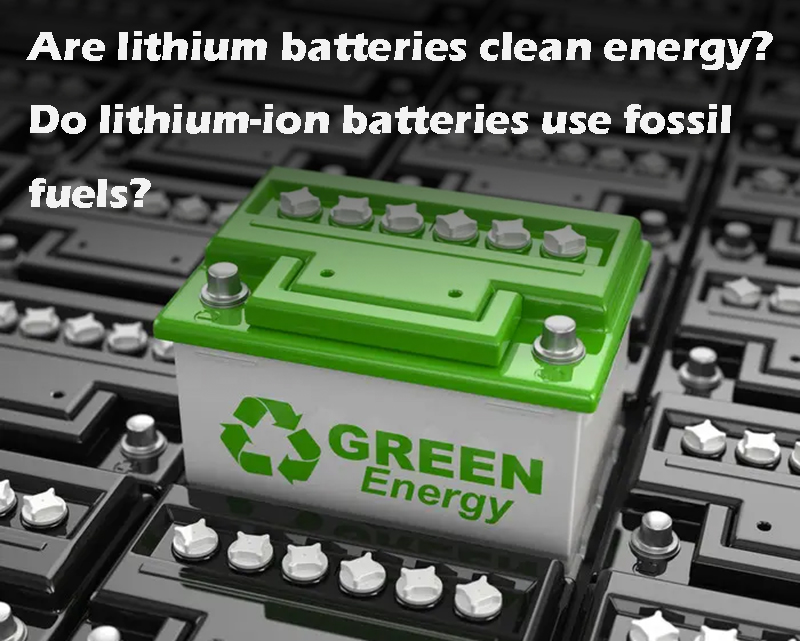
Depending on the materials utilized, their sourcing, and the energy sources employed during production, there might be wide variations in the precise amount of Carbon dioxide released during the protracted process of building a battery. About 73 percent of the world's supply of lithium-ion batteries is produced in China, where coal is the main energy source. Therefore, Lithium ion batteries consume fossil fuels during production process since they require them for the operation of machinery during extraction and other activities.
3.Do lithium ion batteries have a carbon footprint?
Yes, there are specific reasons for the high carbon footprint, and it leaves a carbon imprint during the production process. The source of fuel required during the production process is the production of lithium batteries. The reason is that China, one of the nations that manufactures lithium ion batteries, really obtains 70% of its energy from coal.
4.Why are lithium-ion batteries so popular? What are the advantages of lithium-ion batteries in terms of environmental protection?
Energy density is the major reason you've heard of best lithium batteries before. Energy density is influenced by how many lithium ions (and subsequently electrons) the conductors can store per unit area of surface area. The high energy density makes lithium ions much less in volume and weight than the same size of lead-acid batteries. The fact that they are lightweight and portable from one area to another is one of their biggest advantages.
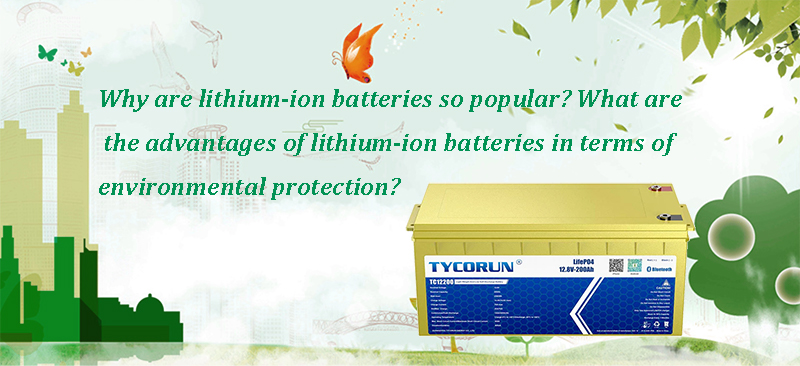
Because of its compact size, it conserves both energy and space. Furthermore, "Li-on" batteries provide a good number of cycles of 4000times of charge and discharge before they need to be replaced. Energy density is influenced, among other things, by how many lithium ions (and subsequently electrons) the conductors can store per unit area of surface area. These batteries are made without the use of any dangerous materials. And they also have a low self discharge rate of 3.5% per month.
5.How bad are Tesla batteries for the environment?
Tesla also uses lithium-ion batteries. It mainly use ternary lithium battery, and choose cylindrical cells. Although ternary lithium batteries do not contain heavy metals such as lead and cadmium, its electrolyte still contains heavy metals such as nickel, cobalt and manganese. If it is not operated properly in the process of recovery, disassembly and treatment, it may still have many problems like organic waste gas emission.
6.Do lithium batteries need to be recycled? Can lithium batteries be 100% recycled?
Rather than being thrown out or placed in municipal recycling bins, Li-ion batteries, or those found in electronic devices and equipment, should be reused at certified batteries electronics recyclers that take batteries. The raw materials of lithium-ion batteries and the battery itself have worth and can all be recovered and used again. Currently, the majority of recyclers only obtain metal. Are lithium ion batteries bad for the environment? No, and they can be recycled. Lithium-ion batteries can be recycled safely. Due to the extreme demand for batteries, which has skyrocketed the cost of scarce raw materials, recycling has become economically necessary.
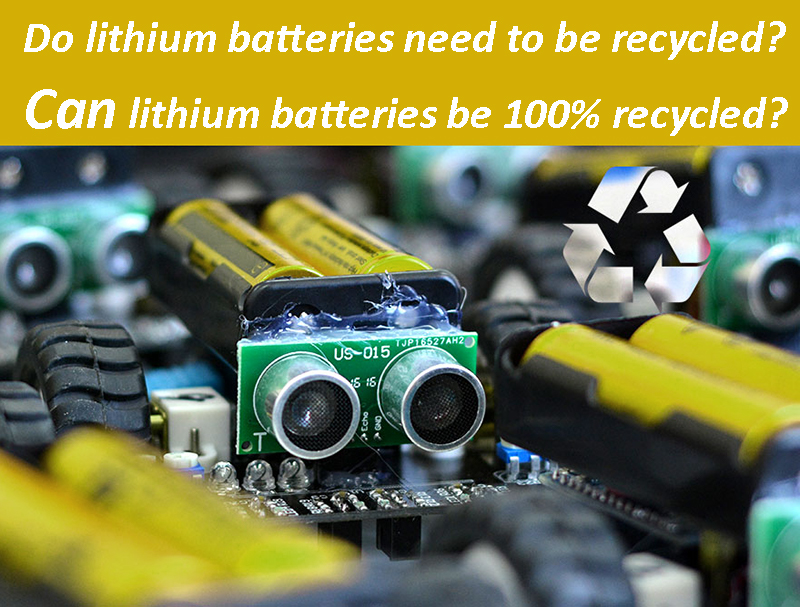
7.What are the benefits of recycling lithium ion batteries? What are recycled lithium batteries used for?
- The materials for used lithium-ion batteries can be recycled and are of great value;
- Lithium-ion batteries can be used twice (they can be used as energy storage batteries and low-power electric vehicles) to better leverage their value;
- It has a positive impact on environmental protection.
Recycled lithium ion batteries would lessen reliance on these resources, increase supply chain security, and lessen the negative effects that these batteries have on people and the environment. In other words, increased recycling would reduce the need for virgin materials and harm to the environment. Recycled lithium ion batteries is always helpful for reducing environmental pollution, in addition to the financial advantages of keeping rare minerals or battery parts. When batteries break down in natural water sources, some of the harmful components they contain can contaminate the surrounding area and potentially the water supply. What occurs then when batteries are disposed of? What steps are involved in recycling batteries? Batteries are first gathered and carefully sorted. Batteries then undergo a number of procedures to separate the primary elements, which include
- Discharge and disassembly of waste batteries;
- Separation of battery active material and current collector;
- Recycling of valuable metals.
8.Which is better for the environment lithium or alkaline batteries?
Lithium batteries are good to the environment. As discuss earlier they are clean source of energy and is good as compared to other types of batteries. Alkaline batteries are susceptible to leaks involving potassium hydroxide.
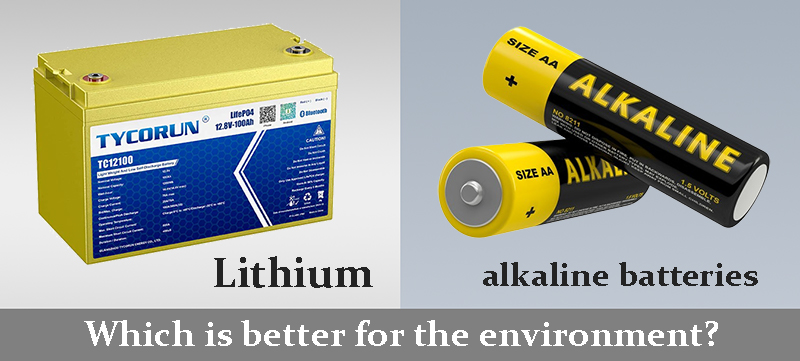
9.In-detail comparison of the environmental protection degree of different battery
Powerful, portable lithium-ion batteries have an extremely high energy density. Our laptops and cell phones are powered by them, and they are now also a vital source of storage for electric vehicles. Within the next three years, lithium-ion installations will experience a major increase in demand. The environment is friendlier to lithium-ion batteries than to lead-acid batteries. This is because lead-acid batteries require more mining to store the same amount of energy as lithium-ion batteries, which has an adverse effect on the environment. Lithium-ion batteries have been considered a possible clean technology because there are some advantages when comparing lithium ion batteries to other electrochemical systems. It is the most environmentally friendly type of battery among all batteries.
|
|
Lithium ion battery |
Lead storage |
|
Impact on the environment |
It is good for the environment |
It is not environment friendly as the lithium ion battery is |
|
Recyclability |
It can be recycled in different ways |
It can be recycled |
|
Raw materials
|
The raw material of li-ion battery is relatively expensive |
The raw material of lead storage battery is easily available |
|
Lifespan |
The cycle life of lithium ion battery is up to 4000 times, which is longer than other types of batteries.
|
The lead storage battery does not show high storage capability and life span. It’s life span is shorter than lithium ion battery. |
To conclude, of all the types of rechargeable batteries now on the market, lithium ion battery packs have the highest energy density. This implies that recharging a lithium battery for fishfinder or other equipment is significantly quicker and easier.
Related article: recycled 18650 batteries for sale, Top 10 power battery recycling companies


